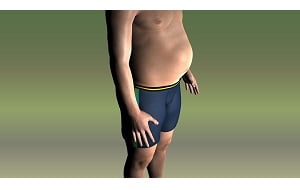Malignant Ascites
- Updated on: Jul 5, 2024
- 4 min Read
- Published on Nov 16, 2020

What is Malignant Ascites?
Ascites is an accumulation of abnormal fluid in the abdomen, specifically in the peritoneal cavity. It usually occurs when the body makes more fluid than it can remove. Ascites can occur due to cancer or some other conditions. When ascites is caused due to cancer, or if the abdomen’s fluid contains cancerous cells, it is often called malignant ascites or malignant peritoneal effusion. Malignant ascites are a manifestation of end-stage events in various cancers and are often associated with a poor prognosis.
Malignancy-related ascites may be seen in the case of several tumors like malignancies of the ovary, breast, colon, lung, pancreas, and liver. Besides, lymphoma can be complicated by chylous ascites. Malignancy-related ascites (ascites due to cancer) is often confused with peritoneal carcinomatosis; however, both are different. Malignant diseases like cancer can cause ascites through different mechanisms. Therefore, the term malignancy-related ascites is a more appropriate descriptor than “malignant ascites” because it includes all of these causes.
Ascites usually builds up in the setting of recurrent or advanced cancers. Mostly, patients may have a history of metastases to the peritoneum or liver, enlarged abdominal lymph nodes, or a large tumor burden before ascites development. The origin of the primary tumor has an impact on the sites of abdominal metastases and the etiology of the ascites.
Malignancies of ovarian and urinary bladder origin as well as peritoneal mesothelioma, result in peritoneal carcinomatosis. In such cases, the accumulation of fluid is due to the blockage of the draining lymphatic channels and increased vascular permeability.
Commonly ascites is a typical complication of certain late-stage cancers due to the accumulation of fluid in the peritoneal cavity from many causes like draining of the lymph system. The malignant ascites life expectancy in many cancer patients is usually short (almost less than three months), but in the case of ovarian and breast cancer patients, the malignant ascites life expectancies are often longer.
In 2018, the incidence of malignant ascites in the U.S. and EU5 has been estimated to be about 500,000 for breast cancer and about 50,000 for ovarian cancer. Almost 3% of the breast cancer patients and 37% of the ovarian cancer patients develop malignant ascites. Similar to ascites caused by liver disease, paracentesis (ascetic drain) is used to remove the ascites that accumulate in the body when diuretics are not effective (refractory ascites). Malignant ascites place a major burden on the patient through regular hospital visits and their daily lives. It also reduces their ability to withstand anti-cancer therapies and potentially reduces survival.
It has been found that approximately 50% of patients with malignant ascites have peritoneal carcinomatosis, with an additional 13% of patients having extensive liver metastases, which ultimately results in portal hypertension.
What Causes Ascites in Cancer Patients?
Malignant ascites in cancer patients can build up through different mechanisms like blocked lymphatic channels due to malignancy, direct fluid production into the abdominal cavity by highly active cancers, and when functional cirrhosis occurs in patients with extensive hepatic metastases resulting in portal hypertension.
Malignant ascites in cancer patients is mostly caused by:
- Metastasis of cancer cells towards the thin lining of the inner abdominal wall (called the peritoneum).
- Tumors blocking the lymphatic system and thereby preventing the flow of lymph fluid properly.
- The liver cannot make enough protein (albumin) and may upset the body’s fluid balance.
- Cancer cells blocking blood flow through the liver.
Malignant ascites develop due to ovarian, uterine (endometrial), cervical, colorectal, stomach (gastric), pancreatic, or primary liver cancers. Metastasis of cancer to the liver can also cause ascites. Some cancers that result in malignant ascites are:
- Ovarian cancer
- Breast cancer
- Bowel cancer
- Stomach cancer
- Pancreatic cancer
- Mesothelioma in the peritoneum
- Lung cancer
- Liver cancer
- Womb cancer
Malignant ascitic fluid can build up when:
- Cancer cells irritate the abdominal lining due to which it produces excess fluid.
- Abdominal lymph glands get blocked and are unable to drain fluid properly.
- Cancer has spread to the liver and increases the pressure in nearby blood vessels, which forces fluid out.
- The liver cannot make enough blood proteins, due to which fluid leaks out of veins into the abdominal cavity.
- Some other conditions that can cause ascitic fluid buildup in the abdomen include heart and liver diseases.
Symptoms of Malignant Ascites
Symptoms of malignant ascites can vary depending on the type of cancer and some other factors. Following are some of the symptoms of malignant ascites:
- Abdominal swelling
- Bloating
- Discomfort or pain in the abdomen
- Fatigue
- Breathing problems
- Weight gain
- Nausea
- Vomiting
- Indigestion
- Loss of appetite, or anorexia
- Early satiety (feeling satisfied after eating a small amount)
- Constipation
- Swelling in ankles or legs
- Sticking and flattening of the umbilicus or belly button
- Increased abdominal girth
- Generalized abdominal pain
Life expectancy/ Prognosis of Malignant Ascites
The Malignant ascites life expectancy has a strong negative prognostic import. However, there are differences in prognosis due to individual malignancies. Malignant ascites of different origins have different survival rates. Malignant ascites due to gastrointestinal malignancies like gastric carcinoma have the poorest prognosis (associated with a median survival of 1.4 months), colon cancer (with a median survival of 3.7 months), and pancreatic cancer (with a median survival of 1.4 months).In a study, it has been found that ascites of ovarian origin has better median survival than all other cancer groups. In addition to malignancy’s origin as being prognostically important, other important factors in the prognosis of malignant ascites in non-ovarian cancer groups, including liver metastases and elevated serum bilirubin.











1 Comment
Interestingly, studies have shown that it cripples estrogen in females by almost 100, and in men by up to 70.